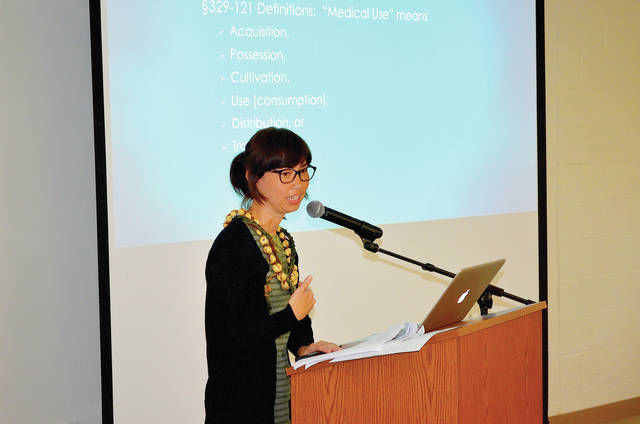PUHI — Dr. Gerald McKenna says the policies regarding medical marijuana in Hawaii are getting ahead of themselves. “We have about four recommendations for marijuana that’s currently available and medically supervised, but the state has moved many other conditions for
PUHI — Dr. Gerald McKenna says the policies regarding medical marijuana in Hawaii are getting ahead of themselves.
“We have about four recommendations for marijuana that’s currently available and medically supervised, but the state has moved many other conditions for marijuana laws that we have, at this time, absolutely no scientific evidence to support it,” said the CEO and medical director for McKenna Recovery Center. “There’s a disconnect.”
McKenna was a guest speaker at the Kauai Rural Health Association’s “Medical Marijuana Law and Impact on Businesses” conference Wednesday at Kauai Community College.
Discussion surrounding the legalization, usage and accessibility of medical marijuana was addressed with over 50 members of the community, including local doctors, police chiefs and attorneys. The conference focused its impact on business and employment policies, said Lani Nagao, president of the Kauai Rural Health Association.
Russell Goo said Kauai should have more information about medical marijuana and dispensaries, which is why he decided to attend.
“It affects our whole community,” Goo said.
McKenna said marijuana can be a viable option for medical use.
“We’re not saying that marijuana used as medicine is a bad idea, but I think that we need to apply the same rigorous study to that as we would to any other medication coming on that market, and that hasn’t happened,” he said.
Scottina Malia Ruis, Medical Marijuana Registry program coordinator, and Tamara Whitney, program specialist, spoke about the red tape that has prevented dispensaries from opening on Kauai and throughout the state.
“Right now, the dispensaries rules are bringing to light some of the things that may be absent from the personal grow side. I mean, 16,000 patients can grow up to 10 plants with no restrictions on where on their premises they have it,” Ruis said. “So the Department of Health recommends certain things like keep it out of sight, be a good neighbor and don’t have it against the fence so kids can’t get to it, things like that.”
Whitney said the process people must go through to obtain a license and a 329 medical card is being streamlined.
“Our application process is almost completely online. In order to qualify for the program, patients must have a debilitating medical condition and be certified by a Hawaii medical doctor or now, an advanced medical practice nurse who has prescription authority,” Whitney said.
Whitney said patients with cancer, glaucoma, HIV/AIDS, post traumatic stress disorder, and or chronic or debilitating diseases can apply for a 329 card. She said lupus, epilepsy, multiple sclerosis and rheumatoid arthritis will be added this year.
Whitney said that over 90 percent of registered patients indicate pain as the reason for applying for a 329 card and 10 percent of registered patients have caregivers. On Kauai, 1,674 patients have been distributed 329 cards from the Registry, as of March 31.
To apply for a dispensary license, Ruis said the application fee alone is $5,000, which is non-refundable. So far, 66 applications have been accepted and eight licenses have been issued. The initial licensing fee is $75,000 and the license renewal fee is $50,000. Only one license has been issued for Kauai.
But before dispensaries can be opened around the state, McKenna said more research needs to be conducted.
“I think the people of Hawaii have the right to have it legalized and decriminalized if that’s what they want,” he said.


